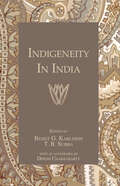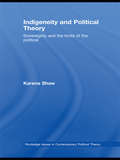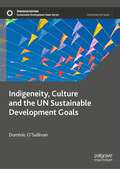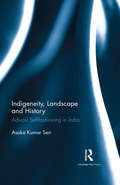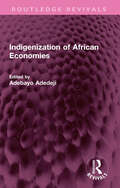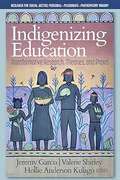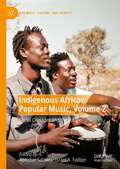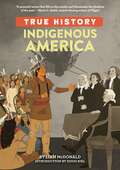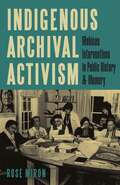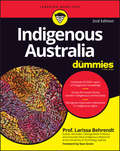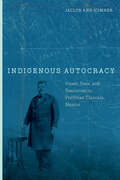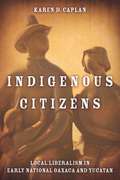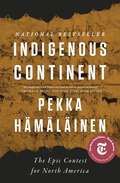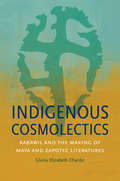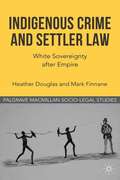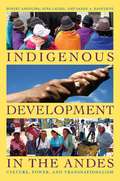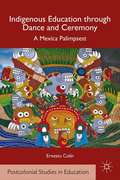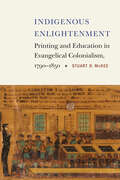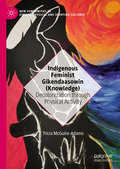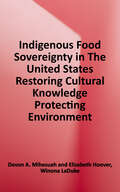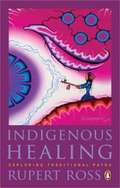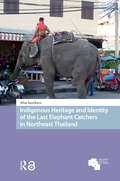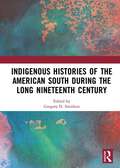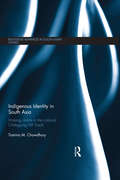- Table View
- List View
Indigeneity In India
by Bengt G. Karlsson Tanka B. SubbaFirst published in 2006. Routledge is an imprint of Taylor & Francis, an informa company.
Indigeneity and Political Theory: Sovereignty and the Limits of the Political (Routledge Issues in Contemporary Political Theory #Vol. 1)
by Karena ShawIndigeneity and Political Theory engages some of the profound challenges to traditions of modern political theory that have been posed over the past two decades. Karena Shaw is especially concerned with practices of sovereignty as they are embedded in and shape Indigenous politics, and responses to Indigenous politics. Drawing on theories of post-coloniality, feminism, globalization, and international politics, and using examples of contemporary political practice including court cases and specific controversies, Shaw seeks to illustrate and argue for a way of doing political theory that is more responsive to the challenges posed by a range of contemporary issues. An engaging and highly original analysis of Indigenenity and sovereignty, this book enables the reader to develop a more robust consideration of relationships between theory and practice, and thus the politics of theorizing.
Indigeneity, Culture and the UN Sustainable Development Goals (Sustainable Development Goals Series)
by Dominic O’SullivanThis is the first scholarly book to examine the UN Sustainable Development Goals from an indigenous perspective and, specifically, with reference to the right to self-determination. It refers to the UN Declaration on the Rights of Indigenous Peoples and domestic instruments such as New Zealand’s Tiriti o Waitangi to suggest how the goals could be revised to support self-determination as a more far-reaching and ambitious project than the goals imagine in their current form. The book primarily draws its material from Australia, Canada, and New Zealand to support analysing the goals’ policy relevance to wealthy states and the political claims that indigenous peoples make in established liberal democracies.
Indigeneity, Landscape and History: Adivasi Self-fashioning in India
by Asoka Kumar SenThis book engages with notions of self and landscape as manifest in water, forest and land via historical and current perspectives in the context of indigenous communities in India. It also brings processes of identity formation among tribes in Africa and Latin America into relief. Using interconnected historical moments and representations of being, becoming and belonging, it situates the content and complexities of Adivasi self-fashioning in contemporary times, and discusses constructions of selfhood, diaspora, homeland, environment and ecology, political structures, state, marginality, development, alienation and rights. Drawing on a range of historical sources – from recorded oral traditions and village histories to contemporary Adivasi self-narratives – the volume will be of great interest to scholars and researchers of modern Indian history, sociology and social anthropology, tribal and indigenous studies and politics.
Indigenization of African Economies (Routledge Revivals)
by Adebayo AdedejiOriginally published in 1981, this book examines the progress of a number of national efforts to move towards economic self-reliance. It consists of case studies from Egypt, Zambia, Ghana, Nigeria, Kenya, Tanzania, Ethiopia, Botswana, Lesotho and Swaziland and Senegal. The studies are set in a framework that outlines the historical background to African economic dependence, and they discuss the theoretical and practical implications of that dependence. It makes an important contribution to the study of indigenization, bringing together a group of African specialists writing from the inside, and articulating the continent’s challenges with convincing authority.
Indigenizing Education: Transformative Research, Theories, And Praxis
by Jeremy Garcia Valerie Shirley Hollie Anderson KulagoIndigenizing Education: Transformative Research, Theories, and Praxis brings various scholars, educators, and community voices together in ways that reimagines and recenters learning processes that embody Indigenous education rooted in critical Indigenous theories and pedagogies. The contributing scholar-educators speak to the resilience and strength embedded in Indigenous knowledges and highlight the intersection between research, theories, and praxis in Indigenous education. Each of the contributors share ways they engaged in transformative praxis by activating a critical Indigenous consciousness with diverse Indigenous youth, educators, families, and community members. The authors provide pathways to reconceptualize and sustain goals to activate agency, social change, and advocacy with and for Indigenous peoples as they enact sovereignty, selfeducation, and Native nation-building. The chapters are organized across four sections, entitled Indigenizing Curriculum and Pedagogy, Revitalizing and Sustaining Indigenous Languages, Engaging Families and Communities in Indigenous Education, and Indigenizing Teaching and Teacher Education. Across the chapters, you will observe dialogues between the scholar-educators as they enacted various theories, shared stories, indigenized various curriculum and teaching practices, and reflected on the process of engaging in critical dialogues that generates a (re)new(ed) spirit of hope and commitment to intellectual and spiritual sovereignty. The book makes significant contributions to the fields of critical Indigenous studies, critical and culturally sustaining pedagogy, and decolonization.
Indigenous (In)Justice: Human Rights Law and Bedouin Arabs in the Naqab/Negev
by Ahmad Amara Ismael Abu-Saad Oren YiftachelThe indigenous Bedouin Arab population in the Naqab/Negev desert in Israel has experienced a history of displacement, intense political conflict, and cultural disruption, along with recent rapid modernization, forced urbanization, and migration. This volume of essays highlights international, national, and comparative law perspectives and explores the legal and human rights dimensions of land, planning, and housing issues, as well as the economic, social, and cultural rights of indigenous peoples. Within this context, the essays examine the various dimensions of the âeoenegotiationsâe#157; between the Bedouin Arab population and the State of Israel. Indigenous (In)Justice locates the discussion of the Naqab/Negev question within the broader Israeli-Palestinian conflict and within key international debates among legal scholars and human rights advocates, including the application of the Declaration on the Rights of Indigenous Peoples, the formalization of traditional property rights, and the utility of restorative and reparative justice approaches. Leading international scholars and professionals, including the current United Nations Special Rapporteur on Violence against Women and the former United Nations Special Rapporteur on the Rights of Indigenous Peoples, are among the contributors to this volume.
Indigenous African Popular Music, Volume 2: Social Crusades and the Future (Pop Music, Culture and Identity)
by Abiodun Salawu Israel A. FadipeThis volume examines how African indigenous popular music is deployed in democracy, politics and for social crusades by African artists. Exploring the role of indigenous African popular music in environmental health communication and gender empowerment, it subsequently focuses on how the music portrays the African future, its use by African youths, and how it is affected by advanced broadcast technologies and the digital media. Indigenous African popular music has long been under-appreciated in communication scholarship. However, understanding the nature and philosophies of indigenous African popular music reveals an untapped diversity which can only be unraveled by the knowledge of myriad cultural backgrounds from which its genres originate. With a particular focus on scholarship from Nigeria, Zimbabwe and South Africa, this volume explores how, during the colonial period and post-independence dispensation, indigenous African music genres and their artists were mainstreamed in order to tackle emerging issues, to sensitise Africans about the affairs of their respective nations and to warn African leaders who have failed and are failing African citizenry about the plight of the people. At the same time, indigenous African popular music genres have served as a beacon to the teeming African youths to express their dreams, frustrations about their environments and to represent themselves. This volume explores how, through the advent of new media technologies, indigenous African popular musicians have been working relentlessly for indigenous production, becoming champions of good governance, marginalised population, and repositories of indigenous cultural traditions and cosmologies.
Indigenous America (True History)
by Liam McDonald&“A powerful series that fills in the cracks and illuminates the shadows of the past.&” –Sherri L. Smith, award-winning author of Flygirl Introducing a new nonfiction series that uncovers hidden histories of the United States.The true story of the United States&’ Indigenous beginnings. American schoolchildren have long been taught that their country was &“discovered&” by Christopher Columbus in 1492. But the history of Native Americans in the United States goes back tens of tens of thousands of years prior to Columbus&’s and other colonizers&’ arrivals. So, what&’s the true history? Complete with an 8-page color photo insert, Indigenous America introduces and amplifies the oral and written histories that have long been left out of American history books.
Indigenous Archival Activism: Mohican Interventions in Public History and Memory
by Rose MironWho has the right to represent Native history? The past several decades have seen a massive shift in debates over who owns and has the right to tell Native American history and stories. For centuries, non-Native actors have collected, stolen, sequestered, and gained value from Native stories and documents, human remains, and sacred objects. However, thanks to the work of Native activists, Native history is now increasingly being repatriated back to the control of tribes and communities. Indigenous Archival Activism takes readers into the heart of these debates by tracing one tribe&’s fifty-year fight to recover and rewrite their history. Rose Miron tells the story of the Stockbridge-Munsee Mohican Nation and their Historical Committee, a group of mostly Mohican women who have been collecting and reorganizing historical materials since 1968. She shows how their work is exemplary of how tribal archives can be used strategically to shift how Native history is accessed, represented, written and, most importantly, controlled. Based on a more than decade-long reciprocal relationship with the Stockbridge-Munsee Mohican Nation, Miron&’s research and writing is shaped primarily by materials found in the tribal archive and ongoing conversations and input from the Stockbridge-Munsee Historical Committee. As a non-Mohican, Miron is careful to consider her own positionality and reflects on what it means for non-Native researchers and institutions to build reciprocal relationships with Indigenous nations in the context of academia and public history, offering a model both for tribes undertaking their own reclamation projects and for scholars looking to work with tribes in ethical ways.
Indigenous Australia For Dummies (For Dummies Ser.)
by Larissa BehrendtA comprehensive, relevant, and accessible look at all aspects of Indigenous Australian history and culture What is The Dreaming? How many different Indigenous tribes and languages once existed in Australia? What is the purpose of a corroboree? What effect do the events of the past have on Indigenous peoples today? Indigenous Australia For Dummies, Second Edition answers these questions and countless others about the oldest race on Earth. It explores Indigenous life in Australia before 1770, the impact of white settlement, the ongoing struggle by Aboriginal and Torres Strait Islander peoples to secure their human rights and equal treatment under the law, and much more. Celebrating the contributions of Indigenous people to contemporary Australian culture, the book explores Indigenous art, music, dance, literature, film, sport, and spirituality. It discusses the concept of modern Indigenous identity and examines the ongoing challenges facing Indigenous communities today, from health and housing to employment and education, land rights, and self-determination. Explores significant political moments—such as Paul Keating's Redfern Speech and Kevin Rudd's apology, and more Profiles celebrated people and organisations in a variety of fields, from Cathy Freeman to Albert Namatjira to the Bangarra Dance Theatre and the National Aboriginal Radio Service Challenges common stereotypes about Indigenous people and discusses current debates, such as a land rights and inequalities in health and education Now in its second edition, this book will enlighten readers of all backgrounds about the history, struggles and triumphs of the diverse, proud, and fascinating peoples that make up Australia's Indigenous communities. With a foreword by Stan Grant, Indigenous Australia For Dummies, Second Edition is a must-read account of Australia’s first people.
Indigenous Autocracy: Power, Race, and Resources in Porfirian Tlaxcala, Mexico
by Jaclyn SumnerWhen General Porfirio Díaz assumed power in 1876, he ushered in Mexico's first prolonged period of political stability and national economic growth—though "progress" came at the cost of democracy. Indigenous Autocracy presents a new story about how regional actors negotiated between national authoritarian rule and local circumstances by explaining how an Indigenous person held state-level power in Mexico during the thirty-five-year dictatorship that preceded the Mexican Revolution (the Porfiriato), and the apogee of scientific racism across Latin America. Although he was one of few recognizably Indigenous persons in office, Próspero Cahuantzi of Tlaxcala kept his position (1885–1911) longer than any other gubernatorial appointee under Porfirio Díaz's transformative but highly oppressive dictatorship (1876–1911). Cahuantzi leveraged his identity and his region's Indigenous heritage to ingratiate himself to Díaz and other nation-building elites. Locally, Cahuantzi navigated between national directives aimed at modernizing Mexico, often at the expense of the impoverished rural majority, and strategic management of Tlaxcala's natural resources—in particular, balancing growing industrial demand for water with the needs of the local population. Jaclyn Ann Sumner shows how this intermediary actor brokered national expectations and local conditions to maintain state power, challenging the idea that governors during the Porfirian dictatorship were little more than provincial stewards who repressed dissent. Drawing upon documentation from more than a dozen Mexican archives, the book brings Porfirian-era Mexico into critical conversations about race and environmental politics in Latin America.
Indigenous Citizens
by Karen D. CaplanIndigenous Citizens challenges the commonly held assumption that early nineteenth-century Mexican state-building was a failure of liberalism. By comparing the experiences of two Mexican states, Oaxaca and Yucatán, Caplan shows how the institutions and ideas associated with liberalism became deeply entrenched in Mexico's regions, but only on locally acceptable terms. Faced with the common challenge of incorporating new institutions into political life, Mexicans—be they indigenous villagers, government officials, or local elites—negotiated ways to make those institutions compatible with a range of local interests. Although Oaxaca and Yucatán both had large indigenous majorities, the local liberalisms they constructed incorporated indigenous people differently as citizens. As a result, Oaxaca experienced relative social peace throughout this era, while Yucatán exploded with indigenous rebellion beginning in 1847. This book puts the interaction between local and national liberalisms at the center of the narrative of Mexico's nineteenth century. It suggests that "liberalism" must be understood not as an overarching system imposed on the Mexican nation but rather as a set of guiding assumptions and institutions that Mexicans put to use in locally specific ways.
Indigenous Continent: The Epic Contest for North America
by Pekka HämäläinenNATIONAL BESTSELLER New York Times Book Review • 100 Notable Books of 2022 Best Books of 2022 — New Yorker, Kirkus Reviews Longlisted for the Andrew Carnegie Medal for Excellence “I can only wish that, when I was that lonely college junior and was finishing Bury My Heart at Wounded Knee, I’d had Hämäläinen’s book at hand.” —David Treuer, The New Yorker “[T]he single best book I have ever read on Native American history.” —Thomas E. Ricks, New York Times Book Review A prize-winning scholar rewrites 400 years of American history from Indigenous perspectives, overturning the dominant origin story of the United States. There is an old, deeply rooted story about America that goes like this: Columbus “discovers” a strange continent and brings back tales of untold riches. The European empires rush over, eager to stake out as much of this astonishing “New World” as possible. Though Indigenous peoples fight back, they cannot stop the onslaught. White imperialists are destined to rule the continent, and history is an irreversible march toward Indigenous destruction. Yet as with other long-accepted origin stories, this one, too, turns out to be based in myth and distortion. In Indigenous Continent, acclaimed historian Pekka Hämäläinen presents a sweeping counternarrative that shatters the most basic assumptions about American history. Shifting our perspective away from Jamestown, Plymouth Rock, the Revolution, and other well-trodden episodes on the conventional timeline, he depicts a sovereign world of Native nations whose members, far from helpless victims of colonial violence, dominated the continent for centuries after the first European arrivals. From the Iroquois in the Northeast to the Comanches on the Plains, and from the Pueblos in the Southwest to the Cherokees in the Southeast, Native nations frequently decimated white newcomers in battle. Even as the white population exploded and colonists’ land greed grew more extravagant, Indigenous peoples flourished due to sophisticated diplomacy and leadership structures. By 1776, various colonial powers claimed nearly all of the continent, but Indigenous peoples still controlled it—as Hämäläinen points out, the maps in modern textbooks that paint much of North America in neat, color-coded blocks confuse outlandish imperial boasts for actual holdings. In fact, Native power peaked in the late nineteenth century, with the Lakota victory in 1876 at Little Big Horn, which was not an American blunder, but an all-too-expected outcome. Hämäläinen ultimately contends that the very notion of “colonial America” is misleading, and that we should speak instead of an “Indigenous America” that was only slowly and unevenly becoming colonial. The evidence of Indigenous defiance is apparent today in the hundreds of Native nations that still dot the United States and Canada. Necessary reading for anyone who cares about America’s past, present, and future, Indigenous Continent restores Native peoples to their rightful place at the very fulcrum of American history.
Indigenous Cosmolectics: Kab'awil and the Making of Maya and Zapotec Literatures (Critical Indigeneities)
by Gloria Elizabeth ChacónLatin America's Indigenous writers have long labored under the limits of colonialism, but in the late twentieth and twenty-first centuries, they have constructed a literary corpus that moves them beyond those parameters. Gloria E. Chacon considers the growing number of contemporary Indigenous writers who turn to Maya and Zapotec languages alongside Spanish translations of their work to challenge the tyranny of monolingualism and cultural homogeneity. Chacon argues that these Maya and Zapotec authors reconstruct an Indigenous literary tradition rooted in an Indigenous cosmolectics, a philosophy originally grounded in pre-Columbian sacred conceptions of the cosmos, time, and place, and now expressed in creative writings. More specifically, she attends to Maya and Zapotec literary and cultural forms by theorizing kab'awil as an Indigenous philosophy. Tackling the political and literary implications of this work, Chacon argues that Indigenous writers' use of familiar genres alongside Indigenous language, use of oral traditions, and new representations of selfhood and nation all create space for expressions of cultural and political autonomy. Chacon recognizes that Indigenous writers draw from universal literary strategies but nevertheless argues that this literature is a vital center for reflecting on Indigenous ways of knowing and is a key artistic expression of decolonization.
Indigenous Crime and Settler Law: White Sovereignty after Empire (Palgrave Socio-Legal Studies)
by Heather Douglas Mark FinnaneIn a break from the contemporary focus on the law's response to inter-racial crime, the authors examine the law's approach to the victimization of one Indigenous person by another. Drawing on a wealth of archival material relating to homicides in Australia, they conclude that settlers and Indigenous peoples still live in the shadow of empire.
Indigenous Development in the Andes: Culture, Power, and Transnationalism
by Robert Andolina Nina Laurie Sarah A. RadcliffeAs indigenous peoples in Latin America have achieved greater prominence and power, international agencies have attempted to incorporate the agendas of indigenous movements into development policymaking and project implementation. Transnational networks and policies centered on ethnically aware development paradigms have emerged with the goal of supporting indigenous cultures while enabling indigenous peoples to access the ostensible benefits of economic globalization and institutionalized participation. Focused on Bolivia and Ecuador, Indigenous Development in the Andes is a nuanced examination of the complexities involved in designing and executing "culturally appropriate" development agendas. Robert Andolina, Nina Laurie, and Sarah A. Radcliffe illuminate a web of relations among indigenous villagers, social movement leaders, government officials, NGO workers, and staff of multilateral agencies such as the World Bank. The authors argue that this reconfiguration of development policy and practice permits Ecuadorian and Bolivian indigenous groups to renegotiate their relationship to development as subjects who contribute and participate. Yet it also recasts indigenous peoples and their cultures as objects of intervention and largely fails to address fundamental concerns of indigenous movements, including racism, national inequalities, and international dependencies. Andean indigenous peoples are less marginalized, but they face ongoing dilemmas of identity and agency as their fields of action cross national boundaries and overlap with powerful institutions. Focusing on the encounters of indigenous peoples with international development as they negotiate issues related to land, water, professionalization, and gender, Indigenous Development in the Andes offers a comprehensive analysis of the diverse consequences of neoliberal development, and it underscores crucial questions about globalization, governance, cultural identity, and social movements.
Indigenous Education through Dance and Ceremony: A Mexica Palimpsest (Postcolonial Studies in Education )
by Ernesto Tlahuitollini" ColínIn the first book on Aztec dance in the United States, Ernesto Colín combines cultural anthropology, educational theory, and postcolonial theory to create an innovative, interdisciplinary, long-term ethnography of an Aztec dance circle and makes a case for the use of the metaphor of palimpsest as an ethnographic research tool.
Indigenous Enlightenment: Printing and Education in Evangelical Colonialism, 1790–1850
by Stuart McKeeIn Indigenous Enlightenment Stuart D. McKee examines the methodologies, tools, and processes that British and American educators developed to inculcate Indigenous cultures of reading. Protestant expatriates who opened schools within British and U.S. colonial territories between 1790 and 1850 shared the conviction that a beneficent government should promote the enlightenment of its colonial subjects. It was the aim of evangelical enlightenment to improve Indigenous peoples&’ welfare through the processes of Christianization and civilization and to transform accepting individuals into virtuous citizens of the settler-colonial community. Many educators quickly discovered that their teaching efforts languished without the means to publish books in the Indigenous languages of their subject populations. While they could publish primers in English by shipping manuscripts to printers in London or Boston, books for Indigenous readers gained greater accuracy and influence when they stationed a printer within the colony. With a global perspective traversing Western colonial territories in the U.S.-Mexico borderlands, the South Pacific, Madagascar, India, and China, Indigenous Enlightenment illuminates the challenges that British and American educators faced while trying to coerce Indigenous children and adults to learn to read. Indigenous laborers commonly supported the tasks of editing, printing, and dissemination and, in fact, dominated the workforce at most colonial presses from the time printing began. Yet even in places where schools and presses were in synchronous operation, missionaries found that Indigenous peoples had their own intellectual systems, and most did not learn best with Western methods.
Indigenous Feminist Gikendaasowin: Decolonization through Physical Activity (New Femininities in Digital, Physical and Sporting Cultures)
by Tricia McGuire-AdamsThis book presents knowledge from Indigenous women who enact decolonization and wellbeing through physical activity. In sport, physical activity, and health disciplines, there is a significant need for Indigenous women’s theoretical and methodological perspectives. While much research is published from a Western perspective on Indigenous peoples’ health, sport, and physical activity, less is known from Indigenous feminist and community perspectives. The chapters therefore inform the broader sociology of sport and Indigenous feminist fields on Indigenous cultural perspectives of physical activity.
Indigenous Food Sovereignty in the United States: Restoring Cultural Knowledge, Protecting Environments, and Regaining Health (New Directions In Native American Studies Ser.)
by Devon A. Mihesuah Elizabeth Hoover"All those interested in Indigenous food systems, sovereignty issues, or environment, and their path toward recovery should read this powerful book." -Kathie L. Beebe, American Indian Quarterly Centuries of colonization and other factors have disrupted indigenous communities' ability to control their own food systems. This volume explores the meaning and importance of food sovereignty for Native peoples in the United States, and asks whether and how it might be achieved and sustained. Unprecedented in its focus and scope, this collection addresses nearly every aspect of indigenous food sovereignty, from revitalizing ancestral gardens and traditional ways of hunting, gathering, and seed saving to the difficult realities of racism, treaty abrogation, tribal sociopolitical factionalism, and the entrenched beliefs that processed foods are superior to traditional tribal fare. The contributors include scholar-activists in the fields of ethnobotany, history, anthropology, nutrition, insect ecology, biology, marine environmentalism, and federal Indian law, as well as indigenous seed savers and keepers, cooks, farmers, spear fishers, and community activists. After identifying the challenges involved in revitalizing and maintaining traditional food systems, these writers offer advice and encouragement to those concerned about tribal health, environmental destruction, loss of species habitat, and governmental food control.
Indigenous Healing: Exploring Traditional Paths
by Rupert RossImagine a world in which people see themselves as embedded in the natural order, with ethical responsibilities not only toward each other, but also toward rocks, trees, water and all nature. Imagine seeing yourself not as a master of Creation, but as the most humble, dependent and vulnerable part. Rupert Ross explores this indigenous world view and the determination of indigenous thinkers to restore it to full prominence today. He comes to understand that an appreciation of this perspective is vital to understanding the destructive forces of colonization. As a former Crown Attorney in northern Ontario, Ross witnessed many of these forces. He examines them here with a special focus on residential schools and their power to destabilize entire communities long after the last school has closed. With help from many indigenous authors, he explores their emerging conviction that healing is now better described as "decolonization therapy." And the key to healing, they assert, is a return to the traditional indigenous world view. The author of two previous bestsellers on indigenous themes, Dancing with a Ghost and Returning to the Teachings, Ross shares his continuing personal journey into traditional understanding with all of the confusion, delight and exhilaration of learning to see the world in a different way. Ross sees the beginning of a vibrant future for indigenous people across Canada as they begin to restore their own definition of a "healthy person" and bring that indigenous wellness into being once again. Indigenous Healing is a hopeful book, not only for indigenous people, but for all others open to accepting some of their ancient lessons about who we might choose to be.
Indigenous Heritage and Identity of the Last Elephant Catchers in Northeast Thailand (Asian Heritages)
by Alisa SantikarnIn 2019, when Mew Salangam passed away at 91, newspapers across Thailand described him as belonging to the last generation of elephant doctors. Mew was a member of the Kui Ajiang community in Thailand, an Indigenous group living in the Northeast known for catching elephants. Sometime beginning in the 1950s, this practice gradually came to an end., Indigenous Heritage and Identity of the Last Elephant Catchers in Northeast Thailand examines how the end of elephant catching has affected the heritage and identity of the Kui Ajiang, offering an analysis that calls for close attention to the broader currents of Thai history and the development of Thai environmental and cultural heritage policies. Furthermore, the term Authorised Environmental Discourse (AED) is introduced in tandem with Laurajane Smith's Authorised Heritage Discourse (AHD) to portray how heritage embedded in nature and culture reflects impacts of political authority and how a community responds to threats of loss and challenges to the authenticity of its traditions.
Indigenous Histories of the American South during the Long Nineteenth Century
by Gregory D. SmithersNative Southerners lived in vibrant societies, rich in tradition and cultural sophistication, for thousands of years before the arrival of European colonization in the sixteenth and seventeenth centuries. Over the ensuing centuries, Native Southerners adapted to the presence of Europeans, endeavouring to incorporate them into their social, cultural, and economic structures. However, by the end of the American Revolutionary War, Indigenous communities in the American South found themselves fighting for their survival. This collection chronicles those fights, revealing how Native Southerners grappled with colonial legal and political pressure; discussing how Indigenous leaders navigated the politics of forced removal; and showing the enduring strength of Native Americans who evaded removal and remained in the South to rebuild communities during the latter half of the nineteenth century. This book was originally published as a special issue of American Nineteenth Century History.
Indigenous Identity in South Asia: Making Claims in the Colonial Chittagong Hill Tracts (Routledge Advances in South Asian Studies)
by Tamina M. ChowdhuryIn the immediate aftermath of the creation of Bangladesh in 1971, an armed struggle ensued in its remote south-eastern corner. The hill people in the Chittagong Hill Tracts, more commonly referred to as paharis, demanded official recognition, and autonomy, as the indigenous people of the Tracts. This demand for autonomy was primarily based on the claim that they were ethnically distinct from the majority ‘Bengali’ population of Bangladesh, and thereby needed to protect their unique identity. This book challenges the general perception within existing scholarship that indigenous claims coming from the Tracts are a recent and contemporary phenomenon, which emerged with the founding of the Bangladesh state. By analysing the processes of colonisation in the Chittagong Hill Tracts, the author argues that identities of distinct ethnicity and tradition predate the creation of Bangladesh, and first began to evolve under British patronage. It is asserted that claims to indigeneity must be understood as an outcome of prolonged and complex processes of interaction between hill peoples – largely the Hill Tracts elites – and the Raj. Using hitherto unexplored archival sources, Indigenous Identity in South Asia sheds new light on how the concepts of ‘territory’, and of a ‘people indigenous to it’ came to be forged and politicised. By showing a far deeper historical lineage of claims making in the Tracts, it adds a new dimension to existing studies on Bangladesh’s borders and its history. The book will also be a key resource for scholars of South Asian history and politics, colonial history and those studying indigenous identity.
